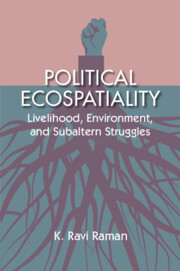Book contents
- Frontmatter
- Contents
- Acknowledgements
- 1 What Is Politics Proper? Why Political Ecospatiality Matters?
- 2 Birlas in Communist Kerala: Clash and Consensus as Subaltern Narratives
- 3 Occupy Muthanga: Land, Forest, and Reinventing Indigeneity and Identity
- 4 Dalits and the Global Cola: Water, Power, and Resistance
- 5 Politics, Epistemology, and Environmental Modernity: Anti-endosulfan as Ethical Practice?
- 6 Caste, Land, and the State: What If Chengara Took the Place of Muthanga?
- 7 Pombilai Orumai: Plantation Dalits, Intersectionality, and Power
- 8 Ecospatiality: Right-Making/State-Making
- Index
8 - Ecospatiality: Right-Making/State-Making
Published online by Cambridge University Press: 31 August 2024
- Frontmatter
- Contents
- Acknowledgements
- 1 What Is Politics Proper? Why Political Ecospatiality Matters?
- 2 Birlas in Communist Kerala: Clash and Consensus as Subaltern Narratives
- 3 Occupy Muthanga: Land, Forest, and Reinventing Indigeneity and Identity
- 4 Dalits and the Global Cola: Water, Power, and Resistance
- 5 Politics, Epistemology, and Environmental Modernity: Anti-endosulfan as Ethical Practice?
- 6 Caste, Land, and the State: What If Chengara Took the Place of Muthanga?
- 7 Pombilai Orumai: Plantation Dalits, Intersectionality, and Power
- 8 Ecospatiality: Right-Making/State-Making
- Index
Summary
With the Occupy protests in the West, which have lately been superseded by the Black Lives Matter movements, we started telling the stories of protest movements in the Global South, with a focus on Kerala. It would also imply that right-making/state-making dialectics ought to be applied to understand and assess state formation and state performance, including that of the Kerala model of development. After the post-independence state formation, the historical landscape of Kerala, by and large, validates the right-making/statemaking thesis despite shortfalls; it appears that after state formation, and until recently, there have been tendencies on the part of the state to put constraints in the process. It strengthened the case for why the confluence of class and race/caste, with its gender expressions, matters for appropriate politics, particularly in leftist groups. Furthermore, research has shown that different communities have been negatively impacted by global crises like the coronavirus pandemic, with the most marginalized members of society bearing the brunt of this burden because they lack access to adequate healthcare, are malnourished, and live in poverty. Neither the exploitation and oppression of global capitalism nor the pandemic is caste- or class-neutral. All the more important is the livelihood and environmental vulnerability of the marginalized in a state which is otherwise known for its social developments and socialist experiments which in turn demands what has been described in this monograph as political ecospatiality.
Threats and enclosures are additional features of the current world, and the pandemic has made individuals who defend their rights even more vulnerable. Countries of the Global South such as Colombia, Niger, Indonesia, and the Philippines are used as examples of neoliberal predations (Burns and LeMoyne 2001; Lucas and Warren 2003; Iwilade 2012; Quimpo 2009). In the case of India, as argued elsewhere, the modalities of emerging power is by and large constituted by the Hindutva–corporate regime; this is further contrasted with the ‘graduated social democratic state’ as in Kerala (Raman 2023). As we describe the problems of the excluded, the future seems as hazy as ever. Yet the ecospatial struggles we narrated so far are optimistic, and so is ecospatiality in its totality, which is in and of itself politics proper.
- Type
- Chapter
- Information
- Political EcospatialityLivelihood, Environment, and Subaltern Struggles in Kerala, pp. 198 - 227Publisher: Cambridge University PressPrint publication year: 2025

